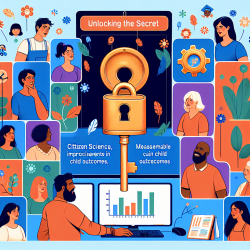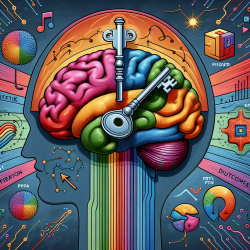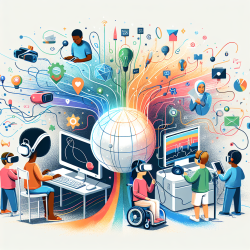Embracing Citizen Science in Speech Therapy: A Path to Enhanced Outcomes
In the evolving landscape of speech-language pathology, practitioners are increasingly seeking innovative methods to improve therapeutic outcomes for children. A recent study, "Citizen Science or Scientific Citizenship? Disentangling the Uses of Public Engagement Rhetoric in National Research Initiatives," sheds light on how citizen science can be leveraged to enhance the efficacy of speech therapy services. This blog explores the key takeaways from the study and offers actionable insights for practitioners looking to integrate these findings into their practice.
The Power of Citizen Science
Citizen science, a term that encapsulates public involvement in scientific research, has gained traction across various fields, including biomedical research. The study emphasizes the role of public engagement in expanding research participation, which is crucial for data-driven decision-making. For speech therapists, this means tapping into a broader pool of data and insights that can inform treatment plans and interventions.
Why Public Engagement Matters
The research highlights two critical aspects of public engagement: participation and involvement. Participation refers to the active role of individuals in providing data, while involvement implies a deeper engagement in the research process, including decision-making and governance. For speech therapists, fostering a culture of engagement with parents and caregivers can lead to more tailored and effective therapy sessions.
Implementing Citizen Science in Speech Therapy
Here are some practical steps for practitioners to harness the benefits of citizen science:
- Encourage Parental Involvement: Involve parents in the therapy process by educating them about the importance of data collection and how they can contribute to their child's progress.
- Leverage Technology: Use online platforms and apps to collect data on children's speech patterns and progress, enabling a more comprehensive analysis.
- Foster Community Engagement: Create a community of practice where parents, therapists, and researchers can share insights and collaborate on improving therapy outcomes.
Challenges and Ethical Considerations
While the integration of citizen science offers numerous benefits, it also presents challenges, particularly in terms of data privacy and ethical considerations. Practitioners must ensure that data collection processes are transparent and that participants are fully informed about how their data will be used. Establishing clear guidelines and obtaining informed consent are crucial steps in maintaining trust and ethical standards.
Conclusion
The study on citizen science provides a compelling case for its integration into speech therapy practices. By embracing public engagement and leveraging data-driven insights, practitioners can enhance therapeutic outcomes and contribute to the broader goal of improving children's communication skills. As we move towards a more collaborative and participatory approach to therapy, the potential for positive change is immense.
To read the original research paper, please follow this link: Citizen science or scientific citizenship? Disentangling the uses of public engagement rhetoric in national research initiatives.










